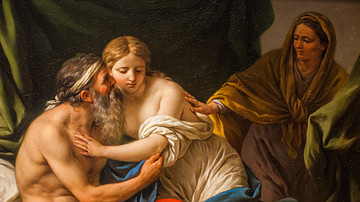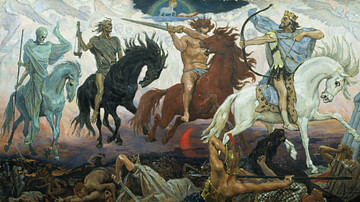Search Articles
Browse Content (p. 77)

Article
Women in the New Testament
Women in the New Testament are presented for the most part along the contours of both Jewish and Greco-Roman concepts of the social construction of gender roles. Women’s value to society was in their role in procreation. There are some exceptions...

Article
Our Favourite Ancient History Shops
World History Encyclopedia’s main mission is to engage people with cultural heritage and to improve history education worldwide. We are achieving this through our definitions and articles, our videos and education resources, our audio articles...

Article
The Legacy of Charles Martel & the Battle of Tours
The Battle of Poitiers aka the Battle of Tours took place over roughly a week in early October of 732. The opposing sides consisted of a Frankish army led by Charles Martel (r. 718-741) against an invading Muslim army under the nominal sovereignty...

Article
Boethius: First of the Medievals?
Anicius Manlius Severinus Boethius (c. 477-524/525) was a scholar in Late Antiquity who was imprisoned and executed by Theodoric (r. 493-526 CE) but was later idolised by medieval intellectuals. His most famous work was De consolatione philosophiae...

Article
The Jolly Roger & Other Pirate Flags
The Jolly Roger with its white skull and crossbones set against a black background has become a rather jovial part of pirate folklore but, in its day, this flag and others with similar blood-curdling designs, had a single and terrifying purpose...

Article
Women in the Old Testament
Modern practitioners of Judaism and Christianity often turn to the Bible for stories concerning women and their roles in ancient religion and society. It is important to acknowledge that these stories were written by men. The male perspectives...

Article
Eyes on the East: Chronicles of the Indian Ocean Spice Trade
As the 15th century ended, Europeans were still mostly in the dark about the Eastern world. Early travelers like Marco Polo had given the West tidbits of information, but these accounts were too highly colored and fragmentary to provide a...

Article
Biblical Apocalypse
Apocalypse (Greek: apokalypsis, an "unveiling of secrets") is not an event, but a text that contains prophesies concerning God’s future intervention, and apocalypticism is a reference for attitudes and worldviews in biblical and non-canonical...

Article
Indian Ocean Trade before the European Conquest
Finding a maritime route to the East and gaining access to the lucrative spice trade stood at the root of the European Age of Exploration. However, when Vasco da Gama rounded the Cape of Good Hope and reached the Indian Ocean in 1493, he...

Article
Prostitution in the Ancient Mediterranean
Prostitution in the ancient world usually referred to a classification of women and men who offered their sexual services outside the parameters of law codes for ancient society. The word 'prostitute' derives from the Latin prostituere ("to...